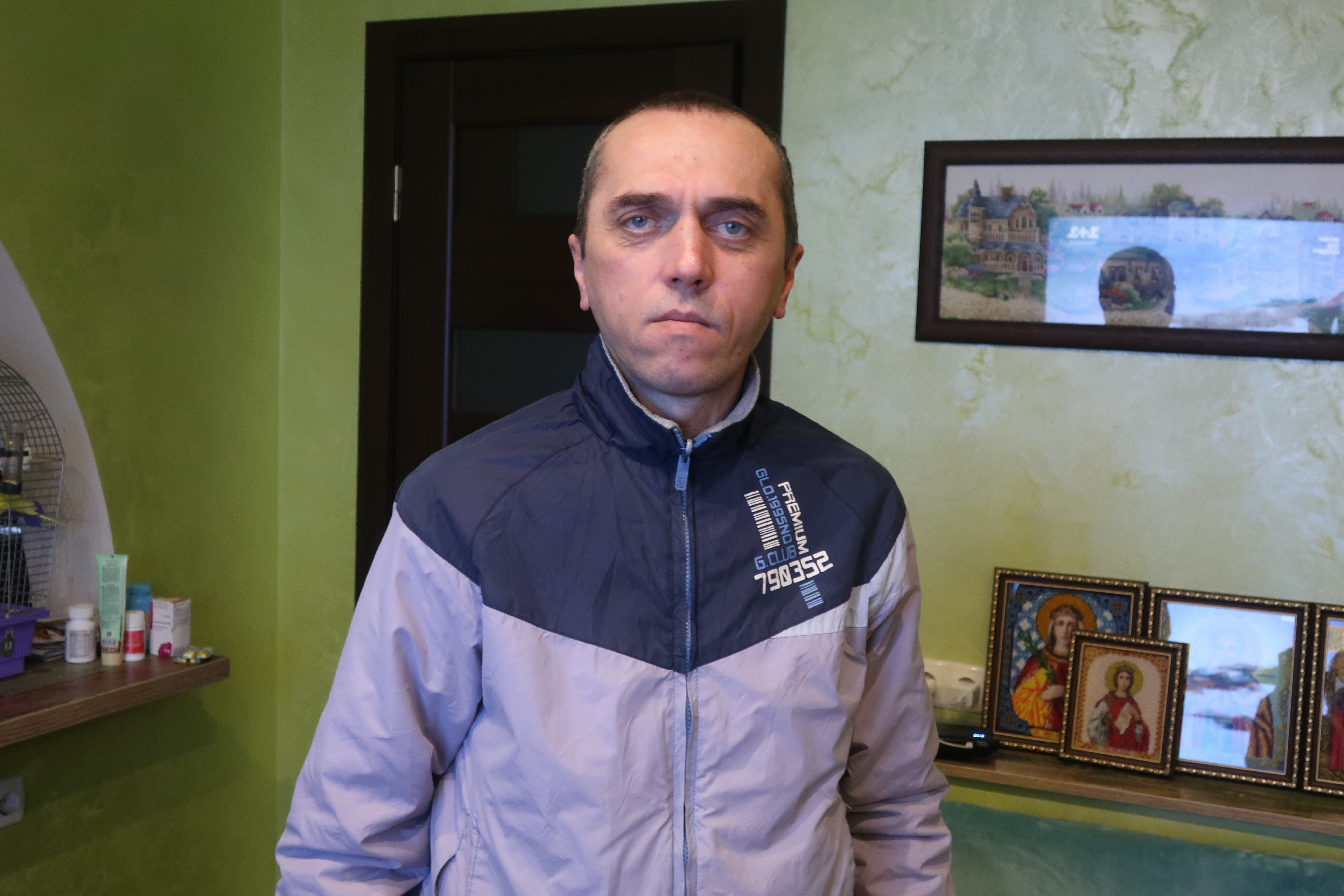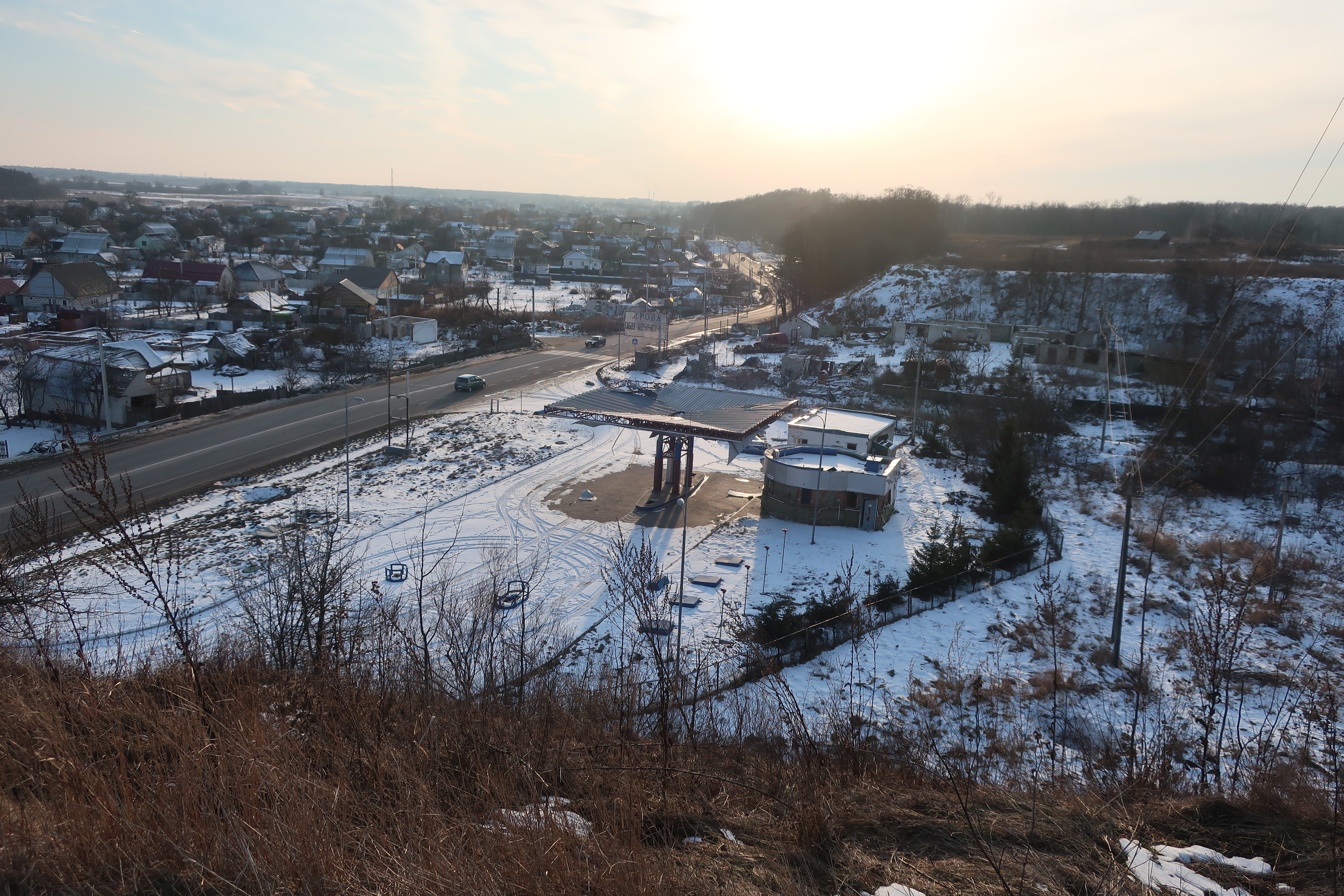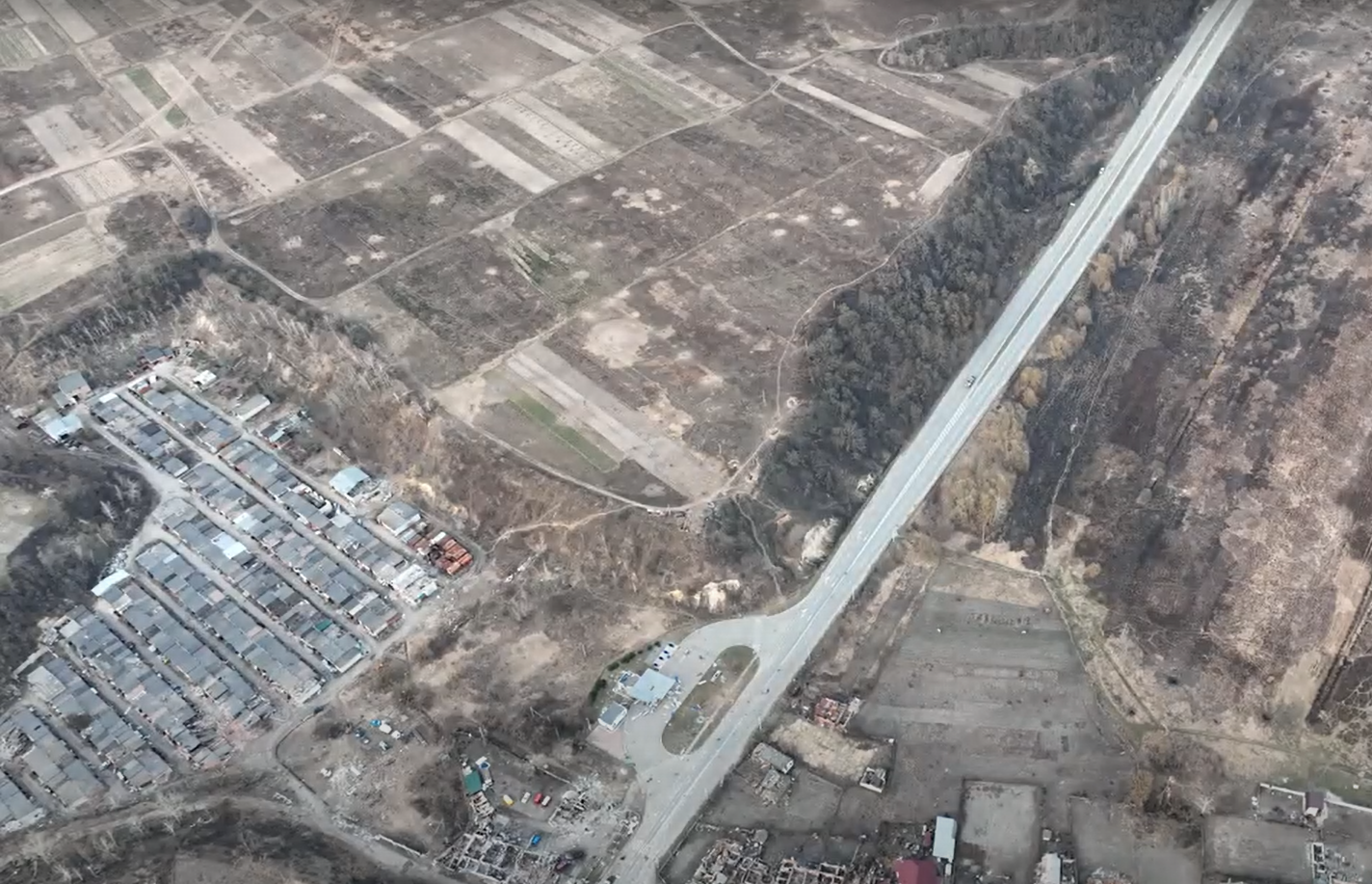12 days in combat and 10 months in captivity. The story of the combatant Oleksandr Antonenko from Chernihiv
47-year-old Oleksandr Antonenko from Chernihiv took part in the battles for the hill near the village of Novoselivka near Chernihiv (an interactive reconstruction of these events is here).
Before the war, he worked as a welder, joined the Armed Forces as a volunteer, and was enlisted in the 1st tank brigade.
He says: "[When we were enlisted in the army], we were told that we were taken to do maintenance, and I was surprised that they would also pay us a salary on top of that. On the same day, we received weapons. But we got no uniform. Whatever kind of clothes people came in, they wore them in combat."
Less than two weeks after voluntary mobilization, Oleksandr was captured during battle.
We spoke with him in January 2023, after he returned home. Next are Oleksandr's direct words.
Translated by Dmitry Lytov & Mike Lytov

Before the battle
Of my 12 days in combat, from March 3 to 15, there was not a single quiet day in Novoselivka. As soon as we drove into position, we were immediately detected by the enemy’s drone. In the evening they started shooting. The shelling became more frequent every day. In the first days, they fired before lunch, for 40 minutes. Then after lunch, in the evening. Then from 10:00 a.m. to 1:00 p.m. without any breaks.
On March 15, they started shelling in the early morning. Then, a short smoke break - and then resumed shelling again until 4:30 p.m. They used everything they possibly could to shoot at us: SAUs (self-propelled howitzers), tanks, cluster shells. Even four 500-kilogram aerial bombs were dropped. We were lucky, because they missed and the bombs only fell near our position, hitting the cemetery instead. The first two explosions were not far from our position, the second two were further away. I got up from the trench to have a smoke. The ditch was up to my waist. I did not have time to finish my cigarette, since I got a feeling that I should go down into the trench. Just as I did it - they shelled us with cluster charges, and our shelter became like a colander. The trees and our dugouts were cut down.

Once a projectile flew right into a trench with our guys. Two died, three were seriously injured. One, they say, died in the hospital. Others suffered bruises, broken arms and legs, but they survived.
We stood right on that hill, where the mass grave later appeared. Near the garages of local residents was a road to the village of Tovstolis. Our position was in front of the road and behind the road, 500 meters away. Closer to the hill was a small dugout where you could rest, take a break, and drink tea. And at the zero position — a trench, a long ditch. That was where the machine gunners were. We covered them from our trench. It was convenient to target the enemy from our height. There were 28 of us in position. We had grenade launchers, AKs, and grenades. We were on duty for 4 hours, including 2 hours at the main height and another 2 near the dugout.

Fight
On March 16, it started around 4:00 a.m. They hit us with artillery, and a tank finished the job. They shot from Kyselivka and Berezanka. They came out, did their job, and hid away.
Then the Russian special assault troops broke through to our zero position. There was noise... boom... gunfire. And suddenly I realized that it was not our machine guns that were shooting, the guns that were shooting were using silencers. I said to my partner: "Alex, this might be it." We pressed against the wall of the trench.
There was an order not to leave the position, we followed it. We had no contact with the commanders. At the same time, one and a half dozen special assault troop soldiers came up to our trench from the left side. They were highly trained fighters, in good bulletproof vests, with night vision goggles and machine guns with silencers. And there were four of us. Before they came, I lit a cigarette, boiled some water in a cup because it was very cold, and Alex sat down to take a nap.
The Russians pointed machine guns into the trench and released a flurry of ammunition.
"Alex was shot in his leg, and screamed," says Oleksandr. “They shouted that we had 10 seconds to decide, or they would throw a grenade. We went out. The Russians brought us to our zero position. The boys there, in the trench, were dead. I did not look at how many were lying; it was still dark.
We were taken to the field, the Russians contacted their commanders. When the shelling started, they threw bulletproof vests on us and covered us. Maybe they thought we were of some value.”
Captivity on the territory of Ukraine
We were taken to the hangar of Vales-M LLC in Berezanka (the Russians were based there). They handcuffed and blindfolded us. We were kept in that hangar until the evening. Then we were transferred to some kind of shack with a stove. There were many military personnel on the territory - artillerymen, tankers, infantry, and special assault troops. They arrived there by "Tiger" trucks, replenished ammunition stocks, and left several times a day. We were guarded by two people. They fed us with their rations - they gave one ration for every four people, which amounted to four spoons of porridge for each of us.
The next day, we were transported to the nearby village of Sedniv and placed on the territory of a starch factory, along with some local people, who were also held captive. We were all kept in the open air for two weeks. Rain, snow, wind - we sat and laid on concrete or on the ground. Some people got frostbite, I was one of them. And behind the fence, at a neighboring enterprise, there may have been a mobile crematorium. I did not see it myself, but the local prisoners talked about it, and the stench of burning flesh was constant. Fighter jets and helicopters flew overhead. The guards did not feed us. Food was provided by the group that transported the wounded. If they were away transporting someone, we knew that there would be no food for two days. On occasions, we were even left without water. But sometimes they even gave us cigarettes, two or three at a time.
I talked to one Russian, he said that he was on a service contract. He was tired of fighting, being sent once to Syria, another time here. He was in all the locations where Russia is fighting. There were also conscripts, he said, but they were not sent to the front line back then. They are like service staff.
Captivity on the territory of Russia
On March 28, their headquarters began to leave Sednev. They took all the prisoners and transported us to the Kursk region in tented Kamaz trucks. Somewhere near the border they stopped, shelling could be heard. There was a military tent camp. Some of the tents were allocated for prisoners, and the first interrogation took place there. On April 11 or 13, we were taken to the Kursk pre-trial detention center.
During interrogations, they offered to switch to their side and move to Russia. Then they asked where our positions were located, which troops were stationed and where, whether we saw foreign mercenaries, where they lived.
Before being put in the cell, there was, as we called it, a "reception". Then I regretted that I had survived. There were thoughts that it would have been better to have remained silent back then, in the trench, so that they would throw a grenade. They beat us with their hands, feet, machine guns, and tasers. One boy was beaten to death. They kept beating him until they realized that he was already dead.
When they beat me, I felt that I was about to lose consciousness, but I held on, because otherwise, I would have been killed. I didn't even hear what they were shouting there, I kept repeating to myself: "I need to get to my cell alive."
On the way to the cell we passed through some offices, where they gave us different clothes, passed us through a cold shower, carried out a medical examination, recorded our data and interrogated us. And then they beat us continuously. It lasted about 4 hours. That day there were 18 prisoners with me who were brought to Kursk.
We also saw our women in captivity. They were kept separately and, it seems, were treated a bit better. But they were also beaten occasionally by female guards. However, our girls were courageous. One, Vika, from Sumy or maybe Zhytomyr, announced a hunger strike.
The cells were different. In one, where I was sitting, there were 22 men. Later that number dropped to 12. All ours, from different cities. Civilians, military. There were some boys from Luhansk. They were kept there until May 6.
One day they gathered us and put us on a military plane. It gave us some hope, we thought we were going on an exchange. But after a few hours of flight, we thought that something was wrong. After landing, we found out we were in Tula. We were kept there for another six months, until December 6.
The conditions, compared to Kursk, were even worse. And there was a "reception". Once they came up with this: they lined us up and told us to stand in the same position all day. We could sit only when we were eating, and we were allowed to go to the toilet. They fed us, generally, the same food as before. In the morning - porridge, bread, tea. For lunch - soup, porridge, bread, jam. In the evening — either porridge or cabbage, a piece of bread and tea. But the food was nourishing and the soup was rich only in the beginning. Two weeks later, we only got water. I lost about 10 kg.
Once we overheard a conversation between the one who distributed the broth and the guard. The latter asked why the soup was lean, why it was only water. And the first one said: "That was the order." They fed us a little, then tried to starve us. When they fed us better, they beat us more. They constantly kept us “fit and alert”. They could get milder on something and harder on something else. Any time we went out of the cell – we got beaten. And we had to leave the cell several times a day — for interrogations, for a walk, for a roll call.
It was stuffy in the cells with many prisoners and cold in those with few inmates. In Tula, there were three to five of us in each cell. The maximum number was 24 people, and the punishment cells only held one. They set aside a separate block, a two-story building, for captured Ukrainians. We counted 253 people there.
Exchange
On the eve of the exchange, we did not know until the last moment where we were being taken. There were no high hopes, given our previous experience. Only four prisoners were taken from Tula that day. First there was a paddy wagon, then a plane. It landed several times, loading more people on board each time. We spent a few hours in a building with a large swimming pool, and two more groups of prisoners were brought there.
The exchange took place in the Sumy region. In the gray area. The Russian soldiers made it to the halfway point, where ours were already waiting. I didn't believe until the last moment that I was coming home. Even when I saw the Ukrainian flag, I still had doubts.
I finally believed it only when they gave me a phone with a Ukrainian SIM card, when I called my wife, heard her voice, my children...
The exchange was 64 for 64. We did not see the Russian soldiers who were exchanged.
At home
The doctors examined us, we washed, changed clothes, and ate. Then we spent two weeks in a hospital in Dnipro. We talked with psychologists and got our documents restored.
All 10 months in captivity, I did not know anything about my relatives, I did not know at all what was happening in Ukraine. The only thing is that during the interrogation one FSB officer said that their troops had already retreated and “it was quiet” in the area where I was captured.
I don't know anything about the other comrades with whom I was in the trench. While in the tent city, I heard from the roll call that they were there. I even saw one. But I hadn’t heard any more about them since being taken to the pre-trial detention center.
Officially, I am a military man, currently on a month's leave, passing a professional fitness commission. I was preliminarily recognized as partially fit. Partially - because I had issues with my frostbitten feet. But I can serve, although not in every military unit.

